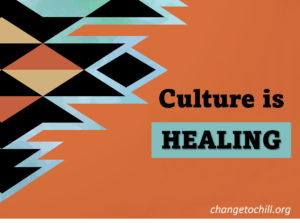
Native American Heritage Month
Native American Heritage month celebrates the rich culture, traditions, and history of the Native/Indigenous people and illuminates the difficult and unique challenges and disparities Native/Indigenous people have historically faced and continue to face due to oppression. Here are some other reasons why we recognize and celebrate Native American Heritage month:
- To honor the influence that Native/Indigenous people have had and continue to have.
- To combat the many disparities and inequities that Native Americans continue to face, while also strengthening Tribal sovereignty.
- To promote health equity and awareness of the disproportionate challenges Native Americans have faced in accessing health care, including during the COVID-19 pandemic

Healing Through Cultural Teachings
Even with the significant challenges and inequities Native and Indigenous communities experience, their traditional cultural practices promote health and well-being.
Change to Chill is partnering with Indigenous Peoples’ Task Force to share information on traditional cultural teachings to promote well-being among Native and Indigenous youth. For example, the four sacred medicines (tobacco, sage, sweetgrass, and cedar) support youth and community physical, mental, and spiritual well-being.*
- Traditional tobacco (asemaa) is primarily used to promote physical, spiritual, emotional, and community well-being by offering guidance and protection. Note that traditional tobacco is not the same as commercial tobacco, which is used in products like cigarettes, e-cigarettes, and smokeless tobacco (i.e., chew, dip).
- Sage (mashkodewashk) is used to release what may be troubling for the mind by removing negative energies and cleansing homes or sacred items.
- Sweetgrass (wiingash), sometimes referred to as the hair of Mother Earth, is used for the calming effect that it has and to remind those of the love and kindness that Mother Earth has for people.
- Cedar (giizhikaandag) is used for purification and serves as a form of protection. Walking with cedar in your shoes is commonly practiced for guidance and protection.
Stay tuned for more!
*Note that the traditional cultural teachings described here are by and for First Nations peoples and often shared with others. The unacknowledged or inappropriate adoption of practices outside of one’s own culture(s) is considered cultural appropriation. Change to Chill does not encourage cultural appropriation.

Community Happenings
Two of our youth partners from Indigenous Peoples’ Task Force, Aalynna Laroque and Nathan Berglund, were honored at the Minnesota United soccer game for Indigenous Peoples’ Day on Sunday, October 9th (pictured). Stay tuned to see their new resources about the four indigenous sacred medicines on the Change to Chill website soon!
Health Powered Kids needs YOUR HELP!
Our sister program, Health Powered Kids is conducting a strategic planning process to shape the future of the program, which serves youth ages 5-14. As part of this process, there are two opportunities for parents, educators, and other youth-serving professionals to provide feedback and ideas. Here’s how to help:
- Take our survey and be entered to win a $25 gift card! Access the survey here: https://www.
surveymonkey.com/r/QKY76DJ - For those who live in Minnesota or Wisconsin only, participate in a 60-minute focus group and receive a $50 gift card for your time. Learn more and register here: Health Powered Kids Focus Group Registration Form
- Share these opportunities with your colleagues and other interested parents and families in your network!

 Pinterest
Pinterest  Instagram
Instagram 

